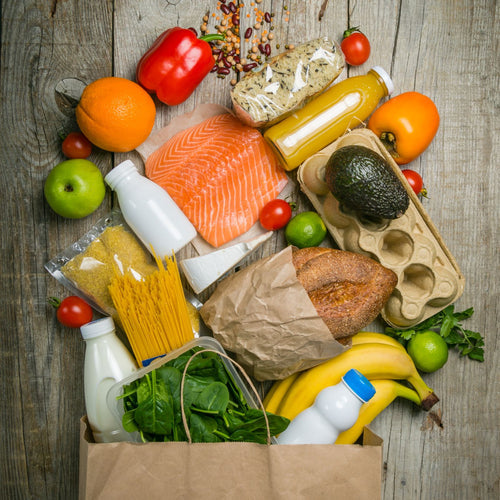With Earth Day just around the corner, I wanted to share a few simple ideas to make your weekly supermarket shop a little more sustainable.
Becoming more eco-conscious can sometimes feel like an “all or nothing” situation — electric cars, solar panels, growing your own veg... And while those things are incredible if you can do them, they’re not always realistic for everyone.
So let’s start small. Let’s start with something simple — your weekly food shop — and look at ways to make it more planet-friendly, without the overwhelm.
🛍 Use reusable shopping bags
Let’s begin with the obvious — but still super important.
A plastic bag can take up to 1,000 years to break down (if it even makes it to landfill). Around 8 million metric tons of plastic end up in our oceans every year — so it’s no surprise if that bag never gets disposed of properly.
The fix? Bring your own bags.
If you always forget them, try this: keep a stash in your car boot and pop them straight back in after unpacking your groceries. Once it becomes a habit, it’s second nature.
♻️ Try a Refill Store
Refill and zero-waste shops are becoming more accessible — and even some big-name supermarkets are getting involved.
Grains, cereals, pasta — they all usually come in single-use plastic. Popping to a local refill store with your own containers can make a real difference.
Top tip: Use reusable linen bags — they’re lightweight, easy to store, and you can decant your goodies into glass jars at home. Win-win!
📝 Plan Your Meals
You don’t have to be super-organised — just jot down a few meals you’d like for the week. Then check your cupboards, and only add what you’re missing to your shopping list.
Meal planning helps reduce waste, keeps costs down, and stops you from buying the same ingredient five times “just in case.”
🛒 Buy Less (and Smarter)
Ever shopped without a list and ended up with a trolley full of random snacks and nothing for dinner? Yep, we’ve all done it.
You overspend, forget essentials, and end up back at the shops the next day.
Sticking to a list (especially when paired with meal planning) helps you buy only what you need — and nothing more.

🚜 Buy Local and Seasonal
Buying local isn’t just about supporting small businesses — it also helps reduce food miles.
Imported food has often travelled thousands of miles to reach your plate, which increases greenhouse gas emissions. Local, seasonal veg is fresher, tastes better, and hasn’t racked up air miles.
🥕 Eat More Veggies
You don’t have to go full veggie — but reducing how much processed food or meat you buy can make a big impact.
Fruits and vegetables (especially when organically grown) require fewer resources and less energy to produce. Organic farmers also avoid harmful chemicals, using natural methods like netting to protect their crops.
Swap out one or two regular items for organic alternatives and see if you notice a difference!
🔄 Check Your Plastics
Sometimes plastic packaging is unavoidable — especially when it helps preserve freshness. But not all plastics are created equal when it comes to recyclability.
The most widely recyclable types?
◾️HDPE (High-Density Polyethylene)
◾️PETE (Polyethylene Terephthalate)
Look for the recycling triangle with a number inside — that’s the resin ID code. Here’s a quick guide:
- Polystyrene (PS) – Difficult to recycle
- Polypropylene (PP) – Limited recyclability
- Polyvinyl Chloride (PVC) – Avoid where possible
- HDPE – Widely recyclable
- LDPE – Occasionally recyclable
- PETE – Widely recyclable
- Other – Mixed plastics, usually not recycled
If you can’t avoid plastic, choose the types that stand the best chance of actually being recycled.
Happy Shopping, and Happy Earth Day! 🌱Every small change makes a difference. Whether you’re bringing your own bags, trying a refill shop, or simply choosing a seasonal veggie instead of one flown halfway across the world — it all adds up.


